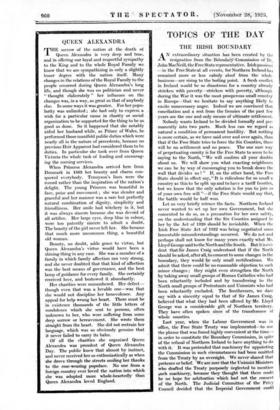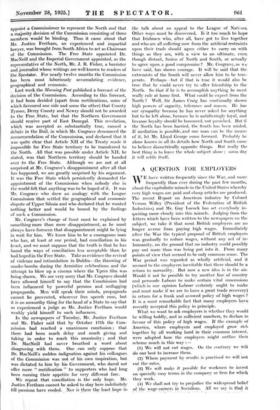A N extraordinary situation has been created by the resignation from
the BoUndait Commission of Dr. - John MacNeill, the Free State representative. Irish passions - —in the Free State at all events, for Northern Ireland hal remained more or less calmly aloof from the whole business—are rising to the boiling point. A fresh conflict in Ireland would be so disastrous for a country already stricken with poverty--stricken with poverty, although - during the War it was the most prosperous small country in Europe—that we hesitate to say anything likely to excite unnecessary anger. Indeed we are convinced that conciliation and a rest from the frenzies of the past few years are the one and only means of ultimate settlement.
Nobody wants Ireland to be divided formally and per- - manently into two parts. Much less can we regard as natural a condition of permanent hostility. But nothing is more certain, as we have said over and over again, than that if the Free State tries to force the Six Counties, there will be no settlement and no peace. The one sure way of perpetuating enmity is for the Free State to seem to be saying to the North, "We will confirm all your doubts about us. We will show you what exacting neighbours we can be by way of encouraging you to break down the wall that divides us ! " If, on the other hand, the Free State should in effect say, " It is ridiculous for so small a country as this to be split up and to have a tariff frontier, but we know that the only solution is for you to join us of your own free will "—if the Free State would say that, the battle would be half won.
Let us very briefly retrace the facts. Northern Ireland never wanted to set up her own Government, but she consented to do so, as a precaution for her own safety, on the understanding that the Six Counties assigned to her by the Act of 1920- should be inviolable. -When the Irish Free State Act of 1922 was being negotiated some lamentable misunderstandings occurred. We do not and perhaps Shall not know for many years- exactly what Mr. Lloyd George said to the North and the South. But it is evi- dent -that Sir James Craig understood that if the North -should be asked, after all, to consent to some changes in the boundary, they would be only small rectifications. We admit that there could-be-no reasonable objection to such minor changes ; they might even strengthen the North by taking away small gronps of Roman Catholics who had been reluctantly included and- by transferring to the North small groups of Protestants and Unionists who had been reluctantly excluded. The Southerners, we dare say with a sincerity equal to that- of Sir James Craig, believed- that what they had been offered by-Mr. Lloyd George was a considerable gift of Northern territory. They have often spoken since of the transference of -whole counties.
Last year; when the Labour Government was in 'office, the Free- State- Treaty was implemented—to use the phrase that was found highly convenient at-the time— in order to constitute the Boundary Commission, in spite of the refusal of Northern Ireland to have anything to do with it. It was pretended that machinery for appointing the Commission in such circumstances had been- omitted from the Treaty by an oversight. We never shared that pretence or belief. We are sure that the Unionist Ministers who drafted the Treaty purposely neglected to mention such machinery, because they- thought that there could be no hope for arbitration which had not the consent of the North. The Judicial Committee of the Privy Council decided that the Imperial Government could appoint a Commissioner to represent the North and that a majority decision of the Commission consisting of three members would be binding. Thus it came about that Mr. Justice Feetham, an experienced and impartial lawyer, was brought from South Africa to act as Chairman of the. Conrimission. The Free State appointed Dr. MacNeill and the Imperial Government appointed, as the representative of the North, Mr. J. R. Fisher, a barrister and journalist whose writings are well known to readers of the Spectator. For nearly twelve months the Commission has been most laboriously accumulating evidence, geographical and economic.
Last week the Morning Post published a forecast of the decision of the Commission. According to this forecast, it had been decided (apart from rectifications, some of which favoured one side and some the other) that County Tyrone, Derry County and Newry should not be awarded to the Free State, but that the Northern Government should receive part of East Donegal. This revelation, which was accepted as substantially true, caused a debate in the Dail, in which Mr. Cosgrave denounced the recommendation of the Commission, and declared that it was quite clear. that Article XII of the Treaty made it impossible for Free State territory to be transferred to the North. All that was possible under Article XII, he stated, was that Northern territory should be handed over to the Free State. Although we are not at all surprised.at Mr. Cosgrave's disappointment after all that has happened, we are greatly surprised by his argument. It was the Free State which persistently demanded the appointment of the Commission when nobody else in the world felt that anything was to be hoped of it. It was Mr. Cosgrave who drew an analogy with the League Commission that settled the geographical and economic dispute of Upper Silesia and who declared that he wanted nothing better and would be bound by the findings of such a Commission.
Mr. Cosgrave's change of front must be explained by something more than mere disappointment, as he must always have-foreseen that disappointment might be lying in wait for him. We know him to be a courageous man who has, at least at one period, had conciliation in his heart, and we must suppose that the truth is that he has found the ways of conciliation less acceptable than he had hoped in the Free State. Take as evidence the revival of violence and intimidation in Dublin—the throwing of smoke-bombs during the Armistice celebrations and the attempt to blow up a cinema where the Ypres film was being shown.. We are very sorry that Mr. Cosgrave should have allowed himself to say that the Commission had been influenced by powerful persons and unflagging propaganda. Men will speak their minds, propaganda cannot be prevented, wherever free speech .runs, but it is an unworthy thing for the head of a State to say that so .experienced a judge as Mr. Justice Feetham would weakly yield himself to such influences.
In the newspapers of Tuesday, Mr. Justice Feetham and Mr. Fisher said that by October 17th the Com- mission had reached a unanimous conclusion ; that there had been much delay and much giving and taking in order to reach this unanimity ; and that Dr. MacNeill had never breathed a word about disagreeing with them. One can only suppose that Dr. MacNeilrs sudden indignation against his colleagues of the Commission was not of his own inspiration, but was dictated to him by his Government, who dared not offer mere. " rectification " to supporters who had long been nursing their appetite for very different fare.
We repeat that conciliation is the only hope. Mr. Justice Feetham cannot be asked to stay here indefinitely till passions have cooled. Nor is there the least hope in the talk about an appeal to the League of Nations. Other Ways must be discovered. "Is it too much to hope that Irishmen who, after all, have got to live together and who are all suffering now from the artificial restraints upon their trade should agree either to carry on with things as they are, with a view to an • ultimate, even though. distant, fusion of North and South, or actually to agree upon a good compromise? Mr. Cosgravc, as we have said, has shown courage. It will be said that the extremists of the South will never allow him to be tem- perate. Perhaps—but if that is true it would also be true that he could never try to offer friendship to the North. So that if he is to accomplish anything he must really rule at home first. What could he expect from the North ? Well, Sir James Craig has continually shown high powers of sagacity, tolerance and reason. He has our sympathy because he has never asked for anything but to be left alone, because he is unfalteringly loyal, and because loyalty should be honoured, not punished. But if the North has been harried, the South has been misled. If mediation is possible, and one man can be the means of it, let Mr. Lloyd George come forward. Probably he alone knows in all its details how North and South came to believe diametrically opposite things. But really the best thing is to leave the whole subject alone ; some day it will settle itself.























































 Previous page
Previous page